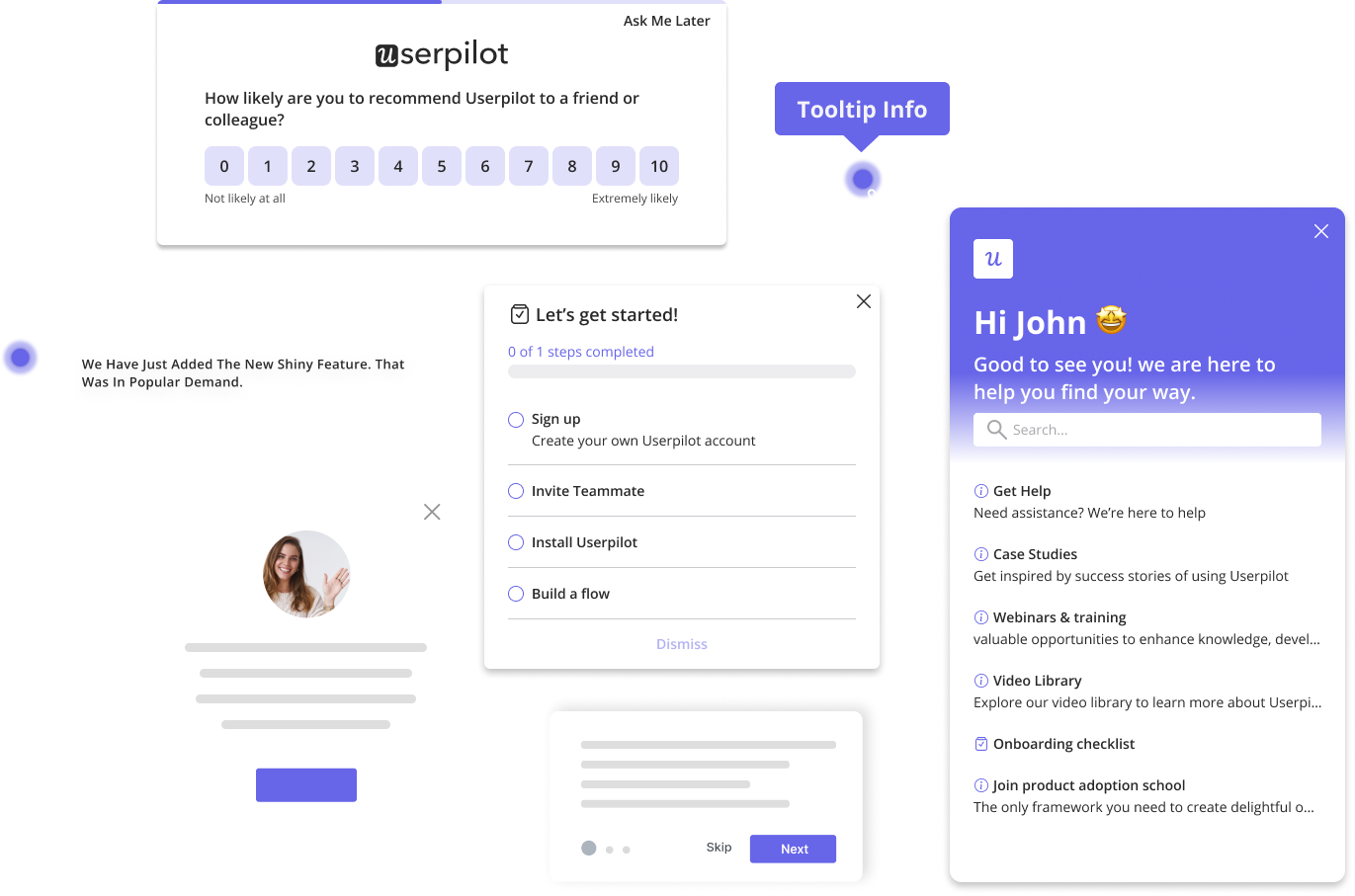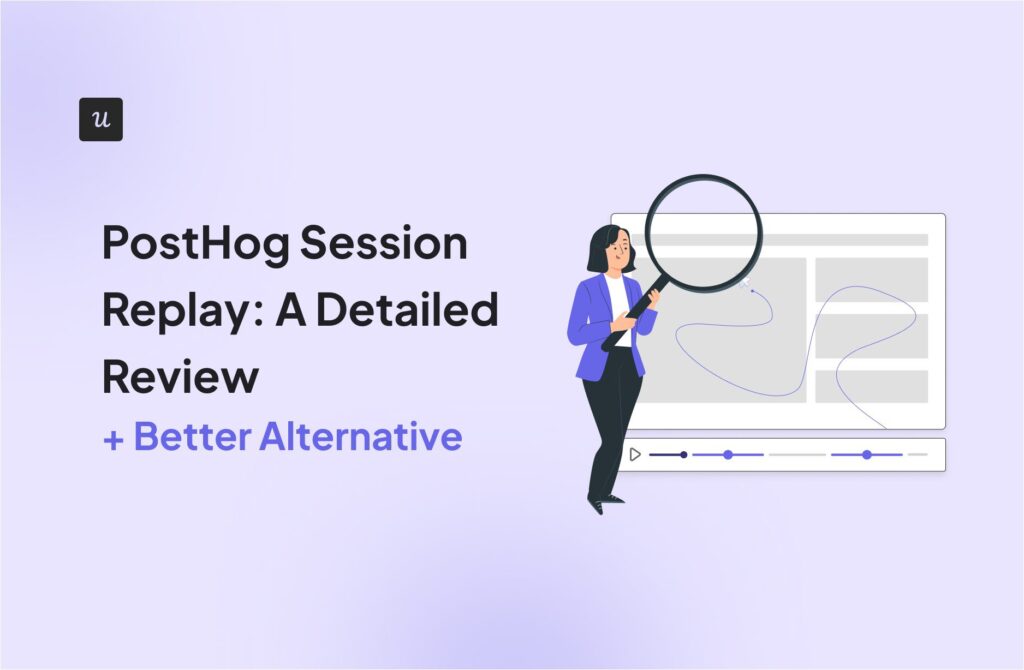
I have been using standalone session replay tools for quite a long time. And while they’re great, hear me out.
They record and replay user sessions to help product managers like myself identify issues and understand how people interact with their products. At first, this seemed like a smart investment for my company, so I invested.
I watched session recordings, analyzed user behavior, and tried to understand it all. But then I realized something.
While my chosen tool showed me what was happening, it left out the why. I couldn’t see which feature the user interacted with, which guide they used, or what stage of the customer journey they were in.
Without that context, I was left guessing. That’s when it hit me. Most session replay tools were the same and didn’t have the whole answer.
Maybe what was needed was a more cohesive tool where you can do it all.
I will show you why these standalone tools fall short and what I implemented to solve this hiccup.
Try Userpilot Now
See Why 1,000+ Teams Choose Userpilot

Reasons why you shouldn’t invest in standalone session recording tools
You might think standalone session replay tools have one flaw, but there’s more to the story.
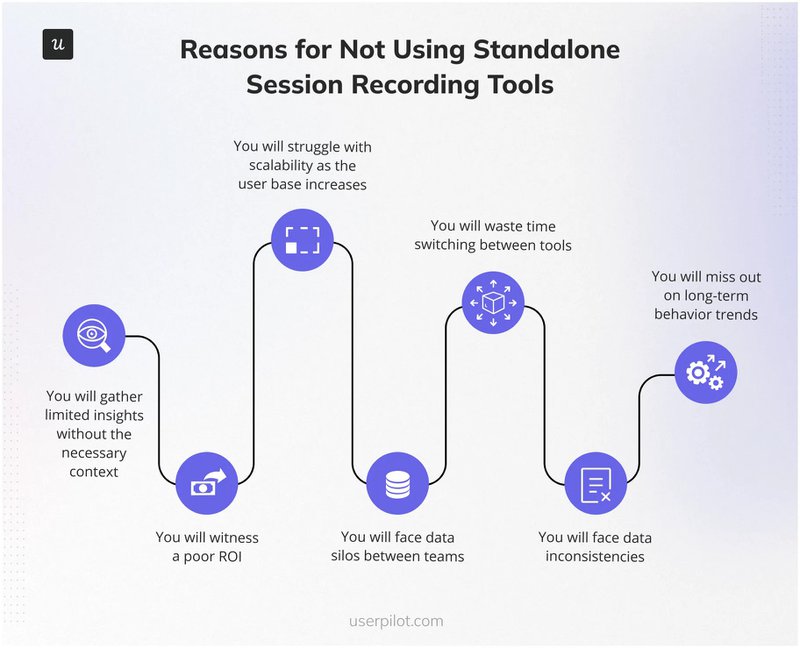
1. You will gather limited insights without the necessary context
Session replay tools might show you what a user did— click a button, scroll past a section, or abandon a task. However, they don’t reveal the WHY behind it. You need to link session recordings to key data like user segments, metadata, or customer journeys to get the whole picture.
This lack of qualitative insights impacts decision-making.
Look for session replay software that ties replays to user events and actions, like tracking behavior with in-app guides. This approach reveals not only what’s happening but also why, so you can make better decisions and improve your product.
2. You will witness a poor ROI
These tools only cover a small part of what I needed, forcing me to invest in additional software for web analytics, A/B testing, and user feedback.
Speaking from experience, the costs add up fast. Instead of saving money, you end up with a bloated tech stack that eats into your budget and slows your team down.
Not sure if your current tools are worth it? Learn how to calculate the software ROI here.
3. You will struggle with scalability as the user base increases
When your user base is small, standalone session replay software seems manageable. You can watch a handful of sessions, take notes, and draw some conclusions for your web apps.
But as your product grows, so does the amount of session data.
Suddenly, you’re buried under hundreds, maybe thousands of session recordings.
Standalone tools don’t have the segmentation features to filter session replays by user behavior or user journey stage, especially in complex web apps. Without those filters, you’re left digging through irrelevant sessions to find one useful insight, which is not only frustrating but also time-consuming.
4. You will face data silos between teams
Standalone session replay software often gets stuck within one department due to how product teams are typically structured.
While these tools capture valuable insights, they rarely reach the marketing, sales, or customer support teams, who also need to understand user behavior to improve their workflows.
The problem gets worse with per-seat pricing, which limits access to a select few. This results in data silos because teams rely on separate tools for data, and no one sees the whole picture.
5. You will waste time switching between tools
If you’re using traditional web analytics tools and standalone session replay software, chances are you’re juggling A/B testing, funnel analysis, and dashboard reporting – all at once. My team felt this pain every day. Everything was so scattered that just getting insights became a full-time job.
Switching between tools broke our workflow and made decision-making a lot harder than it needed to be. By the time we connected disjointed data, hours were gone.
6. You will face data inconsistencies
The more tools you use, the greater the risk of conflicting data. Standalone session replay software collects and analyzes data differently from other platforms, leaving you with numbers that don’t align.
I’ve seen teams lose hours trying to figure out why metrics don’t match instead of focusing on their product. This kind of data discrepancy doesn’t just waste time but also leads to poor decisions.
7. You will miss out on long-term behavior trends
Standalone session recording tools focus on individual sessions, which makes it hard to spot long-term patterns in user interactions. Without trend or cohort analysis, you’re left with fragmented data and no clear understanding of how these user sessions evolved over time.
I have found that all-in-one analytics tools provide features like session replays but also other types of user behavior analyses, allowing you to see the bigger picture and make more accurate decisions.
What should you use instead of standalone session replay tools?
If you want a deeper understanding of session recordings, standalone tools won’t cut it. Decision-makers like you need all-in-one product analytics tools that make your job easier.
With features like path analysis, heatmaps, and user segmentation, you can make the right decisions and improve the customer experience. Here’s why I have invested in all-in-one product analytics software:
- Reduce clutter: Manage session replays, web analytics, and customer feedback all in one place, saving time and cutting tool fatigue.
- Layer context over actions: Link session replays to features, guides, paths, and customer segments to gain insights that standalone tools cannot provide.
- Boost team collaboration: Shared session recording data across teams make sure marketing, sales, and product can align on user insights without silos.
- Real-time insights: Integrated tools provide real-time insights beyond session recordings. They allow you to spot issues as they occur, fix them immediately, and keep your users happy.
My top recommendations for all-inclusive product analytics tools
I’ve talked about why standalone tools don’t quite cut it and how frustrating it can be to juggle multiple platforms to get the full picture.
The good news is that there are few product analytics tools out there that bring it all together. These all-in-one platforms combine session replays, behavior analytics, feedback, and more into a single solution.
I am going to mention the best two options available.
Userpilot for analyzing in-app user behavior
What would you do if you had a session replay tool that doesn’t just track user behavior but also helps you improve it in real-time? Well, Userpilot is just that.
It’s an all-in-one platform that combines web analytics with in-app experiences, user feedback, and much more. Below are its top features:
- Session replay: See how users navigate your product. Focus on key actions, skip inactivity, and spot pain points quickly.
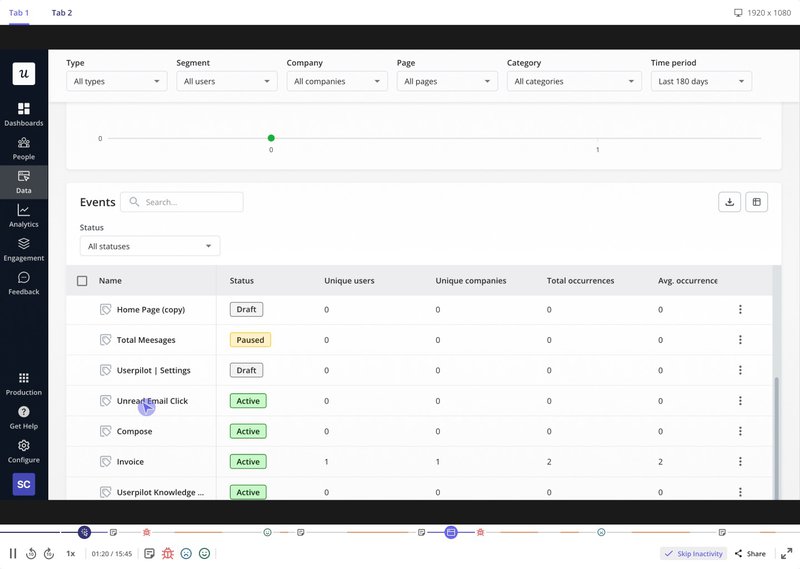
- Analytics reports: Track funnels, trends, paths, and cohorts to uncover patterns in user behavior and make smarter decisions with Userpilot’s built-in analytics.
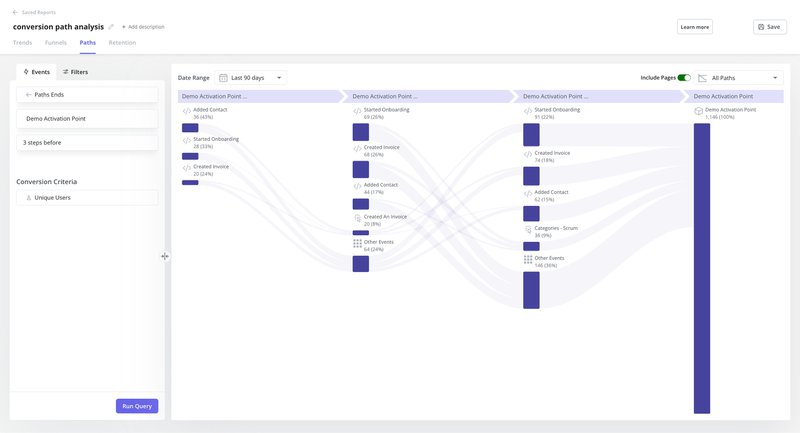
- Custom dashboards: Build custom dashboards tailored to your team’s goals. Get the metrics that matter most in one place.
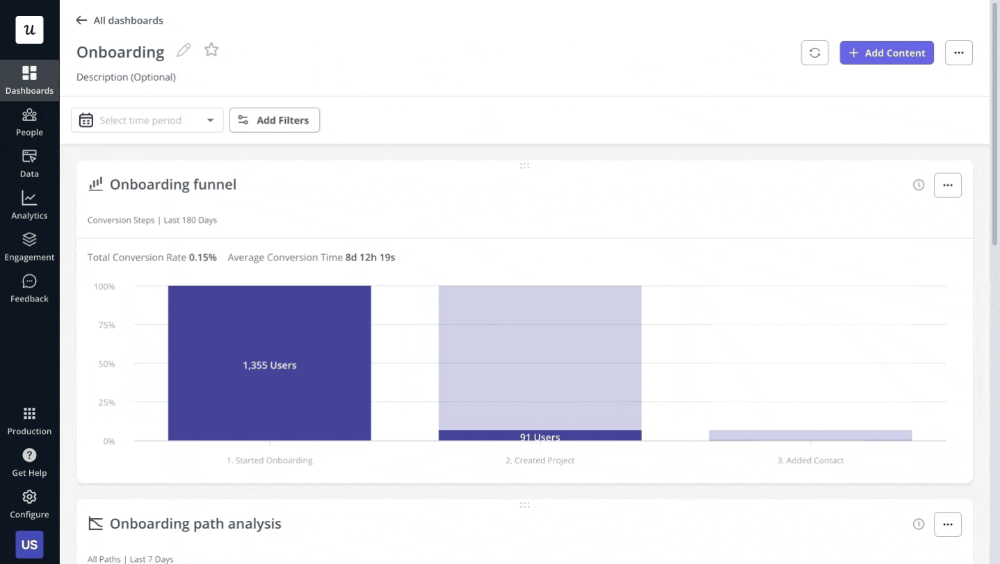
- App feedback: Collect real-time feedback with surveys and feedback widgets. Get a better understanding of customer experience and act on it quickly.
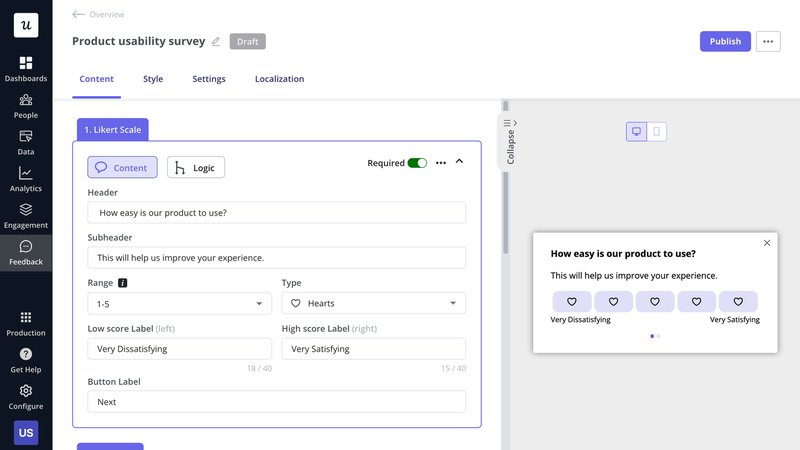
How much does Userpilot cost?
Userpilot offers three pricing plans to suit everyone’s needs:
- Starter: $299/month for up to 2,000 monthly active users. Includes features like segmentation, event tracking, trend analysis, NPS surveys, and up to 5,000 session recordings.
- Growth: Custom pricing for growting teams and offering advanced analytics like funnels, path analysis, auto-capture, and retroactive event tracking. Session replay is available as an add-on.
- Enterprise: Custom pricing for large teams with premium integrations, custom roles, security audits, and more. Session replay is available as an add-on.
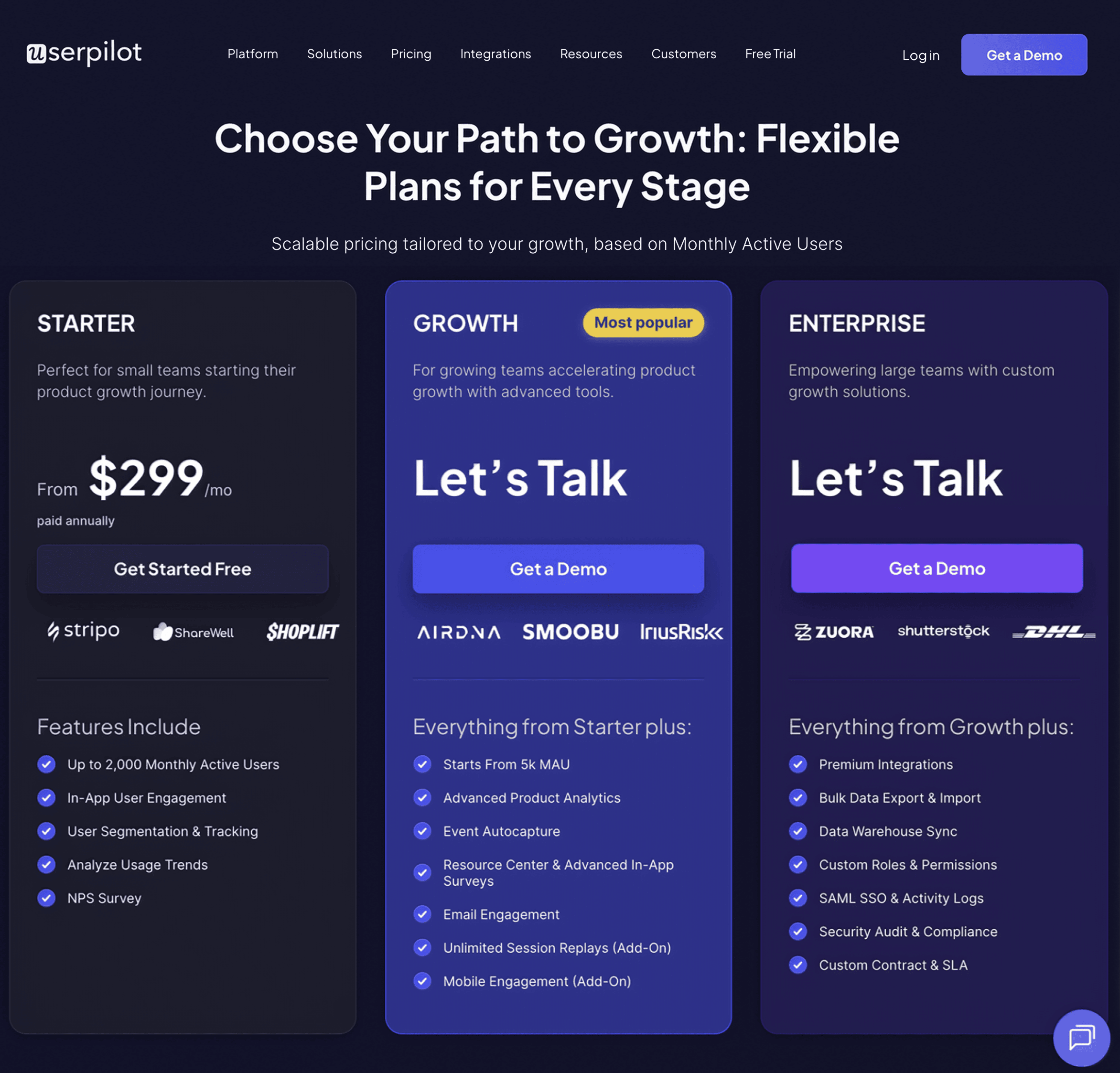
Hotjar for analyzing website customer behavior
Hotjar is a go-to tool for understanding how visitors interact with your website. It focuses on visualizing user actions and collecting feedback to help optimize your site’s usability.
- Session recording: Watch sessions replay to see the user journey throughout your site and identify friction points.
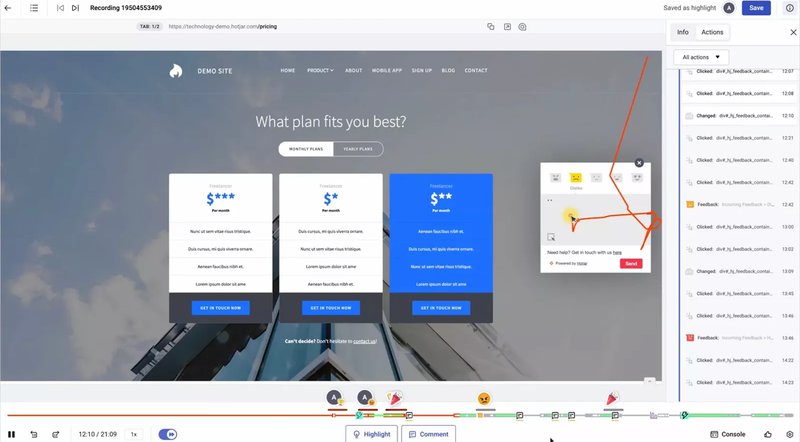
- Heatmaps: Get a clear view of where users click, scroll, or stop engaging so you can refine layouts and improve the user experience.
- Surveys and polls: Gather direct feedback from users to understand their needs and make targeted improvements.
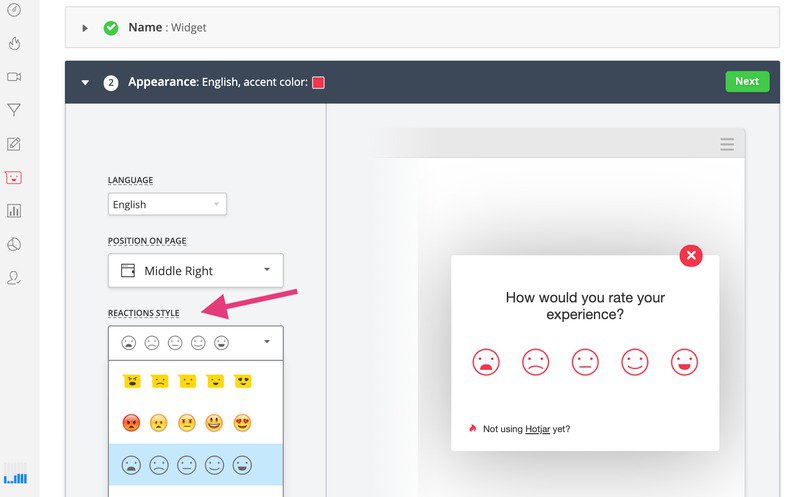
- Behavior insights: Analyze visitor patterns to improve landing pages and address user pain points more effectively.
How much does Hotjar cost?
Hotjar offers four pricing plans covering different needs:
- Basic: Free, supporting up to 35 daily sessions.
- Plus: $39/month for 100 daily sessions.
- Business: $99/month for 500 daily sessions.
- Scale: $213/month for 500 daily sessions, with additional premium features.
Note: The free plan comes with limited data storage and restricted session recording options, so it’s worth considering paid plans for more comprehensive insights.
Where to go from here for better user experience insights
So, we’ve covered why standalone session replay tools aren’t enough and why all-in-one platforms are the smarter choice. Now it’s your turn to take the next step.
Imagine having everything you need in one place—session replays tied to web analytics, segmentation, and in-app flows. Tools like Userpilot make it possible for product managers to make informed decisions, and over 500 teams have already rated it five stars on G2 for a reason.
Why not see it for yourself? Book a free demo today and see how Userpilot can help you understand your users, improve your product, and create experiences they’ll love.

